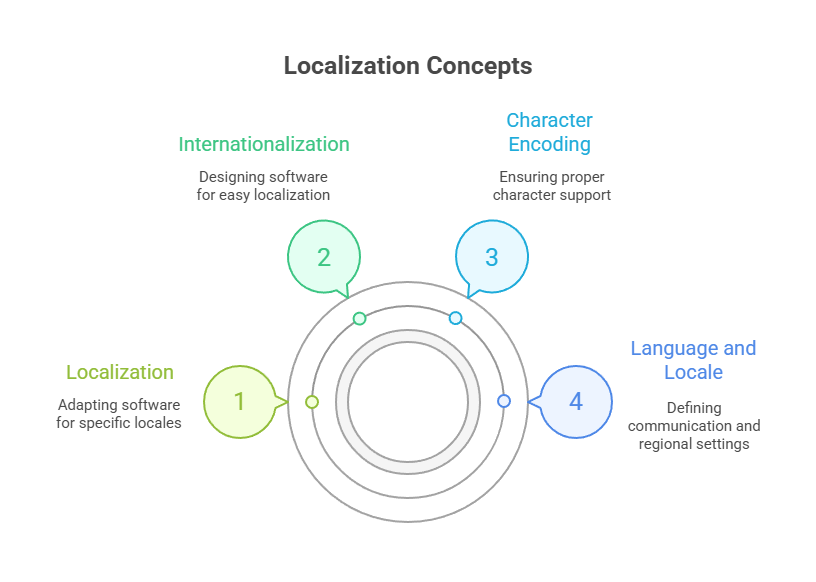Localization Techniques
Localization is the process of adapting software for a specific region or language. In C programming, localization involves making your code adaptable to different languages, cultural conventions, and regional preferences without changing its functionality. This chapter explores various localization techniques in C, from basic to advanced, with comprehensive examples.
Basic Concepts
Internationalization (i18n) and Localization (L10n)
Internationalization is the design and development of software that can be easily localized. Localization is the process of adapting software for a specific locale or language.
Character Encoding
Understanding character encoding is crucial for proper localization. UTF-8 is a common encoding scheme that supports a wide range of characters.
Language and Locale
Languages represent the communication medium, while locales specify regional settings such as date and time formats, currency symbols, and numeric representations.

Localization in C
Using Localization Libraries
C provides libraries like locale.h for localization. This library allows you to set the locale and format data according to the specified locale.
#include <stdio.h>
#include <locale.h>
int main() {
setlocale(LC_ALL, "en_US.UTF-8");
printf("Welcome!\n");
return 0;
}
// output //
Welcome!
Formatting Numbers
Formatting numbers according to the locale’s conventions is essential for proper localization.
#include <stdio.h>
#include <locale.h>
int main() {
setlocale(LC_ALL, "fr_FR.UTF-8");
float number = 1234.5678;
printf("Formatted number: %.2f\n", number);
return 0;
}
Output (for French locale)
// output //
Formatted number: 1234,57
Formatting Dates and Times
Localized date and time formats vary across regions. The strftime() function formats date and time according to the specified locale.
#include <stdio.h>
#include <time.h>
#include <locale.h>
int main() {
setlocale(LC_ALL, "de_DE.UTF-8");
time_t rawtime;
struct tm * timeinfo;
char buffer[80];
time(&rawtime);
timeinfo = localtime(&rawtime);
strftime(buffer, sizeof(buffer), "%c", timeinfo);
printf("Date and time: %s\n", buffer);
return 0;
}
Output (for German locale)
// output //
Date and time: Do 31 Mär 2022 11:25:53
Advanced Techniques
Message Catalogs
Message catalogs are essential for managing translations efficiently. They allow for the separation of translatable strings from the code, making it easier to maintain and update translations without modifying the source code.
#include <stdio.h>
#include <locale.h>
#include <libintl.h>
#include <locale.h>
#define _(String) gettext(String)
int main() {
setlocale(LC_ALL, "");
bindtextdomain("myapp", "/usr/share/locale");
textdomain("myapp");
printf(_("Hello, world!\n"));
return 0;
}
Output (with appropriate translation files)
// output //
Bonjour, le monde!
Unicode Support
Unicode support is crucial for handling text in various languages and scripts. The ICU (International Components for Unicode) library provides comprehensive support for Unicode in C, including character set conversions, collation, and text layout.
#include <stdio.h>
#include <unicode/ustdio.h>
int main() {
UFILE *out = u_finit(stdout, NULL, NULL);
u_fprintf(out, "Hello, 你好, स्वागत!\n");
u_fclose(out);
return 0;
}
// output //
Hello, 你好, स्वागत!
Dynamic Localization
Dynamic localization enables users to switch between languages without restarting the application. This involves loading language-specific resources at runtime based on user preferences.
#include <stdio.h>
#include <locale.h>
#include <libintl.h>
#include <locale.h>
#define _(String) gettext(String)
int main() {
char *locale = setlocale(LC_ALL, "");
bindtextdomain("myapp", "/usr/share/locale");
textdomain("myapp");
printf(_("Welcome to myapp!\n"));
printf("Current locale: %s\n", locale);
return 0;
}
Output (with appropriate translation files and changing locale at runtime)
// output //
Bienvenue dans mon application !
Locale actuelle : fr_FR.UTF-8
Localization is indispensable for creating software that can cater to diverse global audiences. By implementing localization techniques in C, developers can ensure that their software is accessible and user-friendly across different languages and regions. Happy coding !❤️
